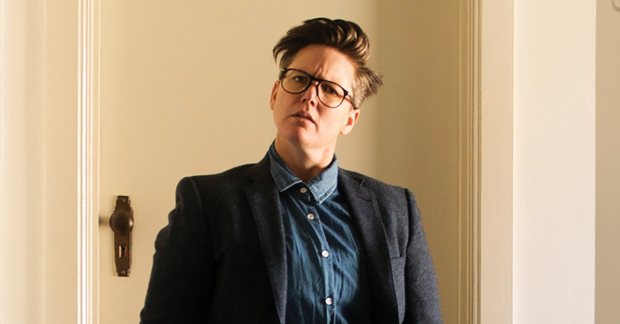Hannah Gadsby's Nanette Follow-Up, Douglas, Proves How Essential Her Art Really Is

(© Alan Moyle)
Hannah Gadsby was performing her solo show Nanette at the pocket-size Soho Playhouse last year when she suddenly became a worldwide sensation. The Netflix release of this comedy special propelled Gadsby, a native of Tasmania, into the stratosphere of fame reserved for artists with surnames like "Schumer" and "Seinfeld." Fame has brought Gadsby a lot of things — a Peabody, an Emmy nomination, the ability to hire a tailor — but as she points out in her lighter but no less imperative new work Douglas at the Daryl Roth Theatre, there's a lot of discomfort that comes with it.
Nanette redefined the expectations of what standup has the potential to be. Gadsby started out with a pretty traditional series of jokes that eventually became a succession of monologues and stories about her mental health, her internalized homophobia, and how she refused to continue debasing herself in order to get laughs. Douglas furthers her interrogation of the form in an effort to tell off the Nanette naysayers, who, as she blisteringly points out, were mostly straight white men whose hardest jabs were that she either wasn't funny or too overweight.
Straight white men throughout history, she notes, have dictated how society perceives women, how female body parts are referred to, and even how feminine nudes are depicted in Renaissance art (Gadsby would know; she has a degree in art history). All of these factors come into play during Douglas, named for her dog and a part of female genitalia named by a man, and because of that, the content of the show doesn't stem from her own self-loathing. It's directed at the very system that caused it in the first place.
Douglas isn't nearly as heavy as Nanette ("If you want trauma, I'm fresh out," Gadsby says at the top), but that doesn't mean the evening is an entirely jovial one. Before she even begins, she brilliantly deconstructs what we're about to see: It'll be traditional stand-up, followed by a lecture, followed by a monologue; there will be two fart jokes and a joke about Louis C.K. that we'll have forgotten about by the time she finally gets to it; and she'll deliver the bombshell revelation that she has autism. This, as she says, is neither a bombshell nor a revelation, since it's common knowledge, but it'll feel like one. It actually leads into one of the funniest jokes I've ever heard.
And amid some pretty hilarious one-liners about Where's Waldo?, male Scottish midwives from the 18th century, golfers, anti-vaxxers, the patriarchy, and the incongruous names of the Teenage Mutant Ninja Turtles, there will be one shattering account of a relationship gone awry. It's this story that gives the show its heart, and it's her ability to weave in and out of all these topics, while analyzing her material as she delivers it, calling back to previous jokes, and going all-in on dad jokes, that proves how essential Gadsby is as a contemporary artist working in a rapidly changing world. Douglas may be coming to Netflix next year, but to see it live is an experience you shouldn't pass up.










